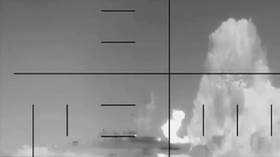US lawmakers assembling secret ‘encyclopedia of spying’

In an effort to keep track of the US government’s sprawling spy efforts, a Senate oversight committee has been compiling a ‘secret encyclopedia’ of surveillance programs ever since the 2013 Snowden revelations.
Begun under former Senate Intelligence Committee chair Diane Feinstein (D-CA) in 2013, the program continued after the Republicans took control of the committee in January, AP reported, citing several Senate staffers who spoke on condition of anonymity.
“We're trying right now to look at every intelligence program,” Feinstein told AP. “There are hundreds of programs we have found ... sprinkled all over. Many people in the departments don't even know (they) are going on.”
AP reported that Director of National Intelligence James Clapper has joked that only one entity had full knowledge of all the US government’s spying programs – “That’s God.”
Read More: NSA holds info over US citizens like loaded gun, but says ‘trust me’ – Snowden
The current committee chair, Senator Richard Burr (R-NC) did not comment, but his spokeswoman, Rebecca Glover Watkins, told AP in an email that the committee was “constantly and continuously engaged in oversight of intelligence community activities.”
It was the revelation that the US eavesdropped on allies, such as German Chancellor Angela Merkel, that prompted Feinstein and other lawmakers to inquire about surveillance programs. President Obama ordered his own review of NSA surveillance at the time, reportedly stopping “some eavesdropping on the leaders of certain unidentified friendly countries,” AP reported.
Lawmakers said they were fully briefed about the programs NSA whistleblower Edward Snowden revealed in 2013, including the collection of Americans’ phone records and the PRISM program that has targeted foreign nationals through accounts with US tech companies such as Yahoo, Google and Microsoft.
However, Feinstein said that even the executive branch had trouble keeping track of all the surveillance programs under Executive Order 12333, which authorized foreign intelligence collection overseas without a court order. Some of the programs are so secret, only a few people are privy to their details.
Read More: Senate accuses CIA of torturing prisoners, overstepping legal boundaries
The committee’s oversight efforts resulted in the 6,000-page report about CIA’s secret torture program. Its 480-page executive summary was released in December 2014. Feinstein said at the time that the agency’s practices undermined "societal and constitutional values that we are very proud of.”
The project to compile the overview of spy efforts is currently entirely a congressional affair, and should wrap up by September, Senate aides told AP. While the idea is for lawmakers to maintain and access information on the spy programs, they are trying to avoid creating a single document that would amount to a roadmap of US surveillance. Officials have said that having such a file in Senate custody would be too risky. Details of the project are classified.
If the senators have objections to any surveillance programs, they can bring up the issue in secret with the White House, and use their influence over legislation, budgets and nominations to press for any changes.












